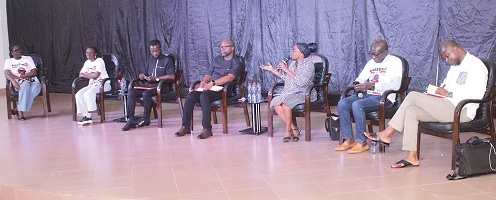The immediate past Dean of the University of Ghana School of Law (UGSoL), Professor Raymond A. Atuguba, has underscored the need for governments to stay away from interfering in the affairs of public universities.
That, he said, would guarantee academic freedom and allow schools to foster innovation, enhance quality education for them to effectively contribute positively to the country’s development.
“I think governments should keep away because it does not allow the universities to flourish,” he said at a panel discussion at the faculty last Friday.
Discussion
The panel discussion was organised on the back of some research conducted by the University of Ghana Law Students, Class of 2026, as part of their International Human Rights Law coursework.
It was titled, “Silencing the Mind: The Quiet War on Academic Freedom in Ghana”.
In his remarks, Prof. Atuguba said the country had made significant progress in academic freedom than several other countries on the continent, adding that Ghana was not entirely free.
For instance, he recounted how he received an anonymous text telling him that it was not his time to become the dean shortly before his appointment.
He also recalled how he had to go to court on different occasions when governments had tried to influence even the appointments of Vice-Chancellors for the school, describing it as despicable.
Prof. Atuguba added that, in addition to this, the faculty’s curriculum needed to be decolonised, saying there was a specific list of courses that the law had prescribed for law students at the faculty level that must be taught to enable students to pass the entrance exams for the professional law programme.
Research
The lecturer of the International Human Rights Law course, Prof. Kwadwo Appiagyei-Atua, explained that while academic freedom was enshrined in various international human rights instruments and Ghana's Constitution, universities faced subtle and sometimes overt challenges.
These challenges, he said, often went unnoticed or undiscussed, creating what he described as a “quiet war” that undermined the very foundation of quality higher education.
Through the project, he said the faculty’s aimed to shed light on issues that raised awareness and fostered critical conversations that could lead to meaningful change in how academic freedom was understood, protected and promoted in Ghana.
Insight
A Law student at the faculty, Ann Aseye Donya, said the project revealed that only half of her peers were familiar with the concept of academic freedom.
She called attention to the insidious barriers that had developed and encouraged open dialogue about values and beliefs.
“Let’s not be afraid to have civil conversations that question ideas,” she said.

